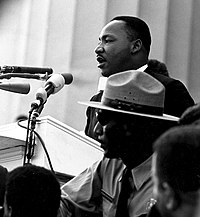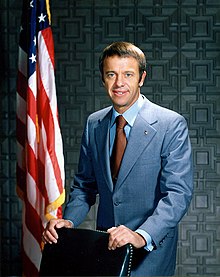Portal:1960s
The 1960s Portal
The 1960s became synonymous with the new, radical, and subversive events and trends of the period. In Africa the 1960s was a period of radical political change as 32 countries gained independence from their European colonial rulers. Some commentators have seen in this era a classical Jungian nightmare cycle, where a rigid culture, unable to contain the demands for greater individual freedom, broke free of the social constraints of the previous age through extreme deviation from the norm. Christopher Booker charts the rise, success, fall/nightmare and explosion in the London scene of the 1960s. However, this alone does not explain the mass nature of the phenomenon. Several nations such as the U.S., France, Germany and Britain turned to the left in the early and mid 1960s. In the United States, John F. Kennedy, a Keynesian and staunch anti-communist, pushed for social reforms. His assassination in 1963 was a stunning shock. Liberal reforms were finally passed under Lyndon B. Johnson including civil rights for African Americans and healthcare for the elderly and the poor. Despite his large-scale Great Society programs, Johnson was increasingly reviled by the New Left at home and abroad. The heavy-handed American role in the Vietnam War outraged student protestors across the globe, as they found peasant rebellion typified by Ho Chi Minh and Che Guevara more appealing. Italy formed its first left-of-center government in March 1962 with a coalition of Christian Democrats, Social Democrats, and moderate Republicans. Socialists joined the ruling block in December 1963. In Britain, the Labour Party gained power in 1964. In Brazil, João Goulart became president after Jânio Quadros resigned. This is a Featured article, which represents some of the best content on English Wikipedia..
The Voting Rights Act of 1965 is a landmark piece of federal legislation in the United States that prohibits racial discrimination in voting. It was signed into law by President Lyndon B. Johnson during the height of the civil rights movement on August 6, 1965, and Congress later amended the Act five times to expand its protections. Designed to enforce the voting rights protected by the Fourteenth and Fifteenth Amendments to the United States Constitution, the Act sought to secure the right to vote for racial minorities throughout the country, especially in the South. According to the U.S. Department of Justice, the Act is considered to be the most effective piece of federal civil rights legislation ever enacted in the country. The National Archives and Records Administration stated: "The Voting Rights Act of 1965 was the most significant statutory change in the relationship between the federal and state governments in the area of voting since the Reconstruction period following the Civil War". The act contains numerous provisions that regulate elections. The act's "general provisions" provide nationwide protections for voting rights. Section 2 is a general provision that prohibits state and local government from imposing any voting rule that "results in the denial or abridgement of the right of any citizen to vote on account of race or color" or membership in a language minority group. Other general provisions specifically outlaw literacy tests and similar devices that were historically used to disenfranchise racial minorities. The act also contains "special provisions" that apply to only certain jurisdictions. A core special provision is the Section 5 preclearance requirement, which prohibited certain jurisdictions from implementing any change affecting voting without first receiving confirmation from the U.S. attorney general or the U.S. District Court for D.C. that the change does not discriminate against protected minorities. Another special provision requires jurisdictions containing significant language minority populations to provide bilingual ballots and other election materials. (Full article...)This is a Good article, an article that meets a core set of high editorial standards.
 The 1960 Atlantic hurricane season was the least active season since 1952. The season officially began on June 15, and lasted until November 15. These dates conventionally delimit the period of each year when most tropical cyclones form in the Atlantic basin. The first system, an unnamed storm, developed in the Bay of Campeche on June 22. It brought severe local flooding to southeastern Texas and was considered the worst disaster in some towns since a Hurricane in 1945. The unnamed storm moved across the United States for almost a week before dissipating on June 29. In July, Hurricane Abby resulted in minor damage in the Leeward Islands, before impacting a few Central American counties — the remnants of the storm would go on to form Hurricane Celeste in the East Pacific. Later that month, Tropical Storm Brenda caused flooding across much of the East Coast of the United States. The next storm, Hurricane Cleo, caused no known impact, despite its close proximity to land. The most significant storm of the season was Hurricane Donna, which at the time was among the ten costliest United States hurricanes. After the precursor caused a deadly plane crash in Senegal, the storm itself brought severe flooding and wind impacts to the Lesser Antilles and Florida, where Donna made landfall as a Category 4 hurricane. It moved northeast and struck North Carolina and Long Island, New York, while still at hurricane intensity. Donna caused at least 428 fatalities and $980 million (1960 USD) in damage. Hurricane Ethel reached Category 3 intensity, but rapidly weakened before making landfall in Mississippi, resulting in only 1 fatality and $1.5 million in losses. The final storm, Florence, developed on September 17. It remained weakened and moved erratically over Cuba and Florida. Only minor flooding was reported. Collectively, the tropical cyclones in 1960 caused at least 454 deaths and about $990.74 million in damage. (Full article...)Selected picture - Attempting to block racial integration at the University of Alabama, Governor George Wallace (left) stands defiantly at the door on June 11, 1963, in an incident known as the Stand in the Schoolhouse Door. Wallace moved aside after being ordered to do so by President John F. Kennedy; years later, he became a born-again Christian and recanted his segregationist views.
Did you know -
Related portalsThis is a Featured article, which represents some of the best content on English Wikipedia..
Alan Bartlett Shepard Jr. (November 18, 1923 – July 21, 1998) was an American astronaut. In 1961, he became the second person and the first American to travel into space and, in 1971, he became the fifth and oldest person to walk on the Moon, at age 47. A graduate of the United States Naval Academy at Annapolis, Shepard saw action with the surface navy during World War II. He became a naval aviator in 1947, and a test pilot in 1950. He was selected as one of the original NASA Mercury Seven astronauts in 1959, and in May 1961 he made the first crewed Project Mercury flight, Mercury-Redstone 3, in a spacecraft he named Freedom 7. His craft entered space, but was not capable of achieving orbit. He became the second person, and the first American, to travel into space. In the final stages of Project Mercury, Shepard was scheduled to pilot the Mercury-Atlas 10 (MA-10), which was planned as a three-day mission. He named Mercury Spacecraft 15B Freedom 7 II in honor of his first spacecraft, but the mission was canceled. (Full article...)This is a Good article, an article that meets a core set of high editorial standards.
Ravi Shankar KBE (Bengali pronunciation: [ˈrobi ˈʃɔŋkor]; born Robindro Shaunkor Chowdhury, sometimes spelled as Rabindra Shankar Chowdhury; 7 April 1920 – 11 December 2012) was an Indian sitarist and composer. A sitar virtuoso, he became the world's best-known expert of North Indian classical music in the second half of the 20th century, and influenced many musicians in India and throughout the world. Shankar was awarded India's highest civilian honour, the Bharat Ratna, in 1999. Shankar was born to a Bengali family in India, and spent his youth as a dancer touring India and Europe with the dance group of his brother Uday Shankar. At age 18, he gave up dancing to pursue a career in music, studying the sitar for seven years under court musician Allauddin Khan. After finishing his studies in 1944, Shankar worked as a composer, creating the music for the Apu Trilogy by Satyajit Ray, and was music director of All India Radio, New Delhi, from 1949 to 1956. He was nominated for the Academy Award for Best Original Score for scoring the blockbuster Gandhi (1982). (Full article...)Selected article -"Garota de Ipanema" (Portuguese pronunciation: [ɡaˈɾotɐ dʒipɐ̃ˈnemɐ]), "The Girl from Ipanema", is a Brazilian bossa nova and jazz song. It was a worldwide hit in the mid-1960s and won a Grammy for Record of the Year in 1965. It was written in 1962, with music by Antônio Carlos Jobim and Portuguese lyrics by Vinícius de Moraes. English lyrics were written later by Norman Gimbel. The first commercial recording was in 1962, by Pery Ribeiro. The Stan Getz recording featuring the vocal debut of Astrud Gilberto became an international hit. This version had been shortened from the version on the album Getz/Gilberto (recorded in March 1963, released in March 1964), which had also included the Portuguese lyrics sung by Astrud's then husband João Gilberto. In the US, the single peaked at number five on the Billboard Hot 100, and went to number one for two weeks on the Easy Listening chart. Overseas it peaked at number 29 on the UK Singles Chart, and charted highly throughout the world. (Full article...)More Did you know (auto generated)
TopicsCategoriesWikiProjects
Associated WikimediaThe following Wikimedia Foundation sister projects provide more on this subject:
Discover Wikipedia using portals |




























